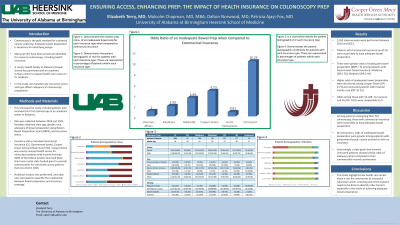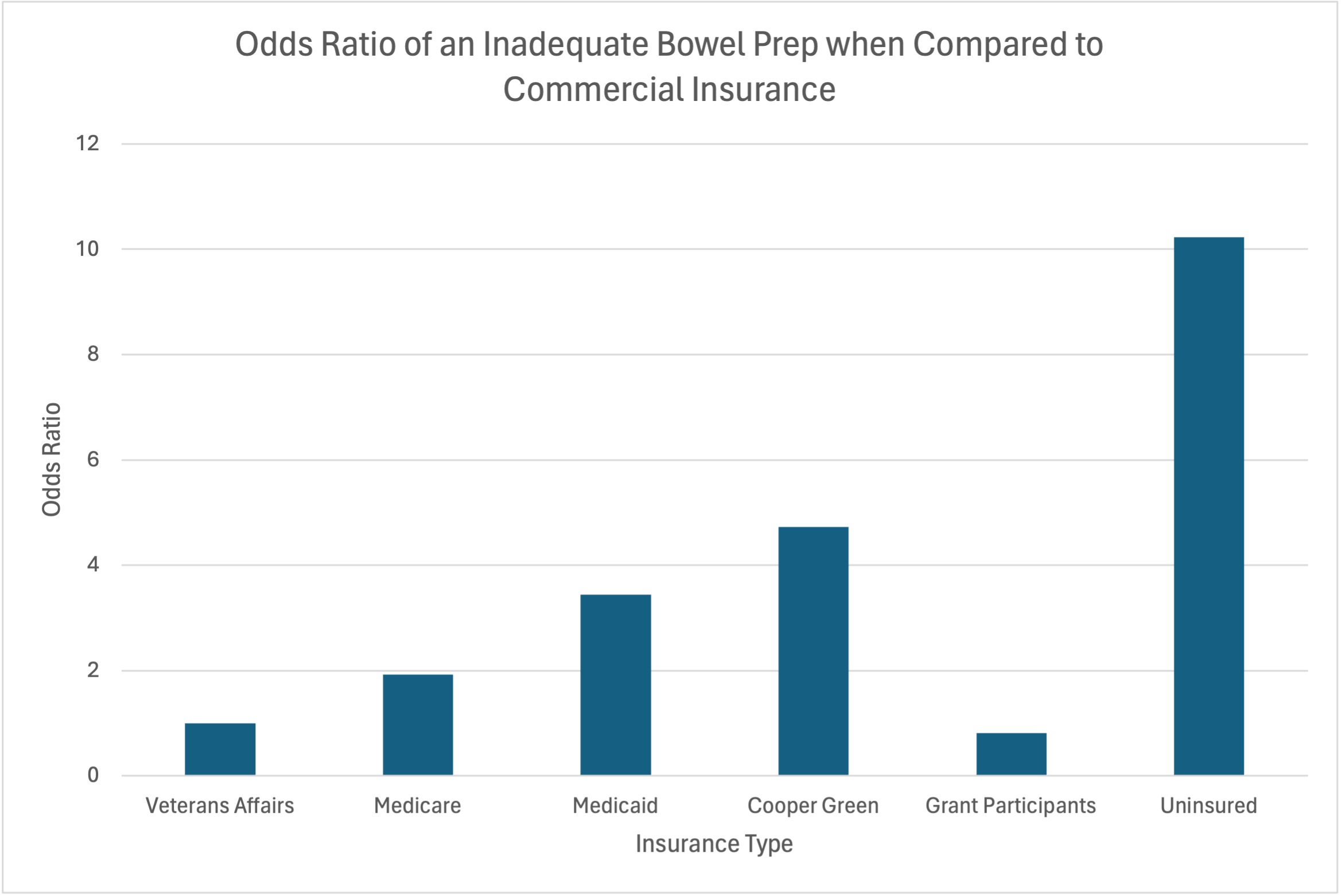Tuesday Poster Session
Category: Colorectal Cancer Prevention
P3868 - Ensuring Access, Enhancing Prep: The Impact of Health Insurance on Colonoscopy Prep
Tuesday, October 29, 2024
10:30 AM - 4:00 PM ET
Location: Exhibit Hall E

Has Audio
- ET
Elizabeth Terry, MD
University of Alabama at Birmingham Heersink School of Medicine
Birmingham, AL
Presenting Author(s)
Elizabeth Terry, MD1, Malcolm B. Chapman, MBA, MD1, Dalton A.. Norwood, MD2, Patricia Ajayi-Fox, MD3
1University of Alabama at Birmingham Heersink School of Medicine, Birmingham, AL; 2UAB Minority Health & Health Equity Research Center, The University of Alabama at Birmingham Heersink School of Medicine, Birmingham, AL; 3Basil I. Hirschowitz Endoscopic Center of Excellence, The University of Alabama at Birmingham Heersink School of Medicine, Birmingham, AL
Introduction: Colonoscopy is the gold standard for colorectal cancer screening. Adequate bowel preparation is necessary for identifying polyps. Many barriers have been previously identified for access to colonoscopy, including health insurance. A county health facility in Alabama (Cooper Green) has partnered with an academic tertiary center to expand health care access to its residents. In this study, we evaluate how insurance access and type affects adequacy of colonoscopy preparation.
Methods: This retrospective study included patients who received their first colonoscopy at an academic center in Alabama. Data was collected between 2018 and 2023. Variables obtained were age, gender, race, adequacy of bowel preparation using Boston Bowel Preparation Score (BBPS), and insurance status. Insurance status included Commercial (CI), Government based, Cooper Green (CG)and State Grant (SG). CG was county covered health access for uninsured residents with income less than 200% of the federal poverty level and SG was a pilot state funded grant to provide colonoscopies for uninsured county patients that occurred in 2023. Statistical analysis was done, and odds ratio calculated to quantify the relationship between bowel preparation and insurance coverage.
Results: 5,932 colonoscopies were performed between 2018 and 2023. Patients with CI (n=3121) were most likely to have adequate bowel preparation. There were greater odds of inadequate bowel preparation (BBPS < 6) among patients with government based insurance: Medicare (OR:1.93), Medicaid (OR:3.44). Higher odds of inadequate bowel preparation were also found among CG (OR: 4.73) and uninsured patients with hospital charity care (OR: 10.23). Odds among those with VA (OR: 1) insurance and SG (OR: 0.81) were comparable to CI.
Discussion: Among patients undergoing their first colonoscopy, those with commercial insurance were most likely to have adequate bowel preparation. By comparison, odds of inadequate bowel preparation were greater among patients with government-based, county assisted or with no insurance. Interestingly, a state grant that covered uninsured patients showed similar odds of adequacy when compared to their commercially insured counterparts. This study highlights how health care access alone is not the only barrier to successful colorectal cancer screening and more research needs to be done to identify other barriers especially in the realm of achieving adequate bowel preparation.

Note: The table for this abstract can be viewed in the ePoster Gallery section of the ACG 2024 ePoster Site or in The American Journal of Gastroenterology's abstract supplement issue, both of which will be available starting October 27, 2024.
Disclosures:
Elizabeth Terry, MD1, Malcolm B. Chapman, MBA, MD1, Dalton A.. Norwood, MD2, Patricia Ajayi-Fox, MD3. P3868 - Ensuring Access, Enhancing Prep: The Impact of Health Insurance on Colonoscopy Prep, ACG 2024 Annual Scientific Meeting Abstracts. Philadelphia, PA: American College of Gastroenterology.
1University of Alabama at Birmingham Heersink School of Medicine, Birmingham, AL; 2UAB Minority Health & Health Equity Research Center, The University of Alabama at Birmingham Heersink School of Medicine, Birmingham, AL; 3Basil I. Hirschowitz Endoscopic Center of Excellence, The University of Alabama at Birmingham Heersink School of Medicine, Birmingham, AL
Introduction: Colonoscopy is the gold standard for colorectal cancer screening. Adequate bowel preparation is necessary for identifying polyps. Many barriers have been previously identified for access to colonoscopy, including health insurance. A county health facility in Alabama (Cooper Green) has partnered with an academic tertiary center to expand health care access to its residents. In this study, we evaluate how insurance access and type affects adequacy of colonoscopy preparation.
Methods: This retrospective study included patients who received their first colonoscopy at an academic center in Alabama. Data was collected between 2018 and 2023. Variables obtained were age, gender, race, adequacy of bowel preparation using Boston Bowel Preparation Score (BBPS), and insurance status. Insurance status included Commercial (CI), Government based, Cooper Green (CG)and State Grant (SG). CG was county covered health access for uninsured residents with income less than 200% of the federal poverty level and SG was a pilot state funded grant to provide colonoscopies for uninsured county patients that occurred in 2023. Statistical analysis was done, and odds ratio calculated to quantify the relationship between bowel preparation and insurance coverage.
Results: 5,932 colonoscopies were performed between 2018 and 2023. Patients with CI (n=3121) were most likely to have adequate bowel preparation. There were greater odds of inadequate bowel preparation (BBPS < 6) among patients with government based insurance: Medicare (OR:1.93), Medicaid (OR:3.44). Higher odds of inadequate bowel preparation were also found among CG (OR: 4.73) and uninsured patients with hospital charity care (OR: 10.23). Odds among those with VA (OR: 1) insurance and SG (OR: 0.81) were comparable to CI.
Discussion: Among patients undergoing their first colonoscopy, those with commercial insurance were most likely to have adequate bowel preparation. By comparison, odds of inadequate bowel preparation were greater among patients with government-based, county assisted or with no insurance. Interestingly, a state grant that covered uninsured patients showed similar odds of adequacy when compared to their commercially insured counterparts. This study highlights how health care access alone is not the only barrier to successful colorectal cancer screening and more research needs to be done to identify other barriers especially in the realm of achieving adequate bowel preparation.

Figure: Figure 1: Odds Ratio of an Inadequate Bowel Prep When Compared to Commercial Insurance
Note: The table for this abstract can be viewed in the ePoster Gallery section of the ACG 2024 ePoster Site or in The American Journal of Gastroenterology's abstract supplement issue, both of which will be available starting October 27, 2024.
Disclosures:
Elizabeth Terry indicated no relevant financial relationships.
Malcolm Chapman indicated no relevant financial relationships.
Dalton Norwood indicated no relevant financial relationships.
Patricia Ajayi-Fox indicated no relevant financial relationships.
Elizabeth Terry, MD1, Malcolm B. Chapman, MBA, MD1, Dalton A.. Norwood, MD2, Patricia Ajayi-Fox, MD3. P3868 - Ensuring Access, Enhancing Prep: The Impact of Health Insurance on Colonoscopy Prep, ACG 2024 Annual Scientific Meeting Abstracts. Philadelphia, PA: American College of Gastroenterology.
